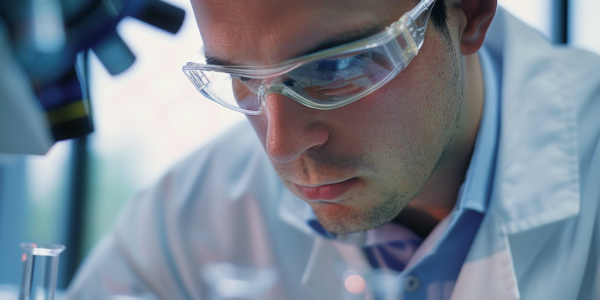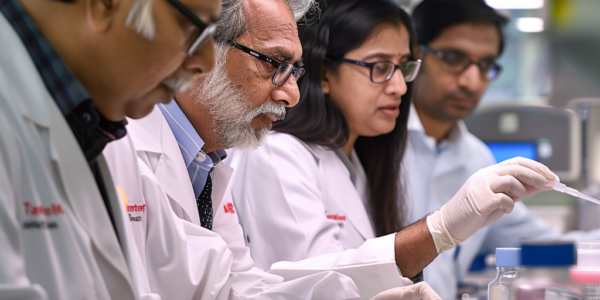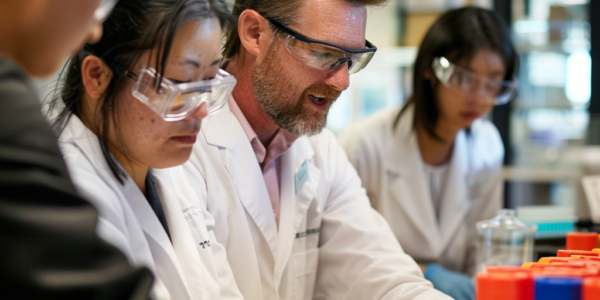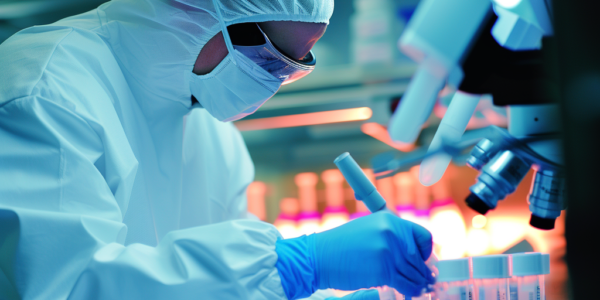AI-Based Tool HLA Inception Has Potential to Revolutionize Personalized Cancer Treatments
Arizona State University scientists have developed an AI-based learning tool called HLA Inception, which has the potential to revolutionize personalized cancer treatments. The tool can predict how an individual’s immune system responds to foreign cells, expediting the process of making predictions on pathological outcomes of patients and potentially transforming patient care.
Improved Cancer Tests Lead to Better Treatments
University of Oklahoma research has introduced a promising strategy for better cancer tests, leading to more effective treatments. The study compares the efficacy of immunohistochemistry (IHC) and next-generation sequencing (NGS) in detecting patients best suited for immunotherapy, with NGS proving superior. This research not only highlights the need for reevaluation of current testing recommendations but also paves the way for a more personalized approach to cancer treatment, ultimately improving patient life quality and making cancer less deadly.
Researchers Make Strides in Understanding LAG-3 Protein
Researchers at Stanford University and New York University have made significant strides in understanding the properties of the LAG-3 protein, shedding light on its structure and function. This breakthrough could have far-reaching implications for the development of immune checkpoint inhibitor drug candidates targeting LAG-3. The study, published in Proceedings of the National Academy of Sciences, provides crucial insights into the molecular structure of LAG-3 and how it operates. LAG-3, like other checkpoint proteins, serves to prevent the immune system from attacking non-threatening entities. In the context of cancer, these proteins can shield tumor cells from immune recognition, hindering the body’s natural defense mechanisms. While existing antibody treatments focus on checkpoint proteins CTLA-4 and PD-1, the unique mode of action of LAG-3 presents an opportunity for novel approaches in cancer therapy. Scientists are optimistic about the potential of targeting LAG-3, driven by its distinct mechanisms compared to CTLA-4 and PD-1.
Enobosarm Shows Promising Antitumor Activity in ER-Positive, HER2-Negative Advanced Breast Cancer
A recent study published in The Lancet Oncology has shown promising antitumor activity of enobosarm in patients with ER-positive, HER2-negative advanced breast cancer. The study assessed the activity and safety of enobosarm in women with previously treated locally advanced or metastatic breast cancer, with results showing potential benefits but also some drug-related adverse events. The study was funded by GTx, the original developer of enobosarm, and has implications for the potential role of androgen receptor modulation in cancer therapy.
Groundbreaking Cancer Metastasis Discovery and Nutraceutical Therapy Development
Tata Memorial Centre doctors have made a groundbreaking discovery in cancer research, revealing a mechanism for cancer metastasis and developing nutraceutical therapy to reduce its risk. The study’s findings shed light on the hazards of chemo and radiotherapy, prompting a reevaluation of current cancer treatment practices. This breakthrough has the potential to revolutionize cancer treatment and offers new hope for patients battling this devastating disease.
Modifying Chemotherapy Treatment Improves Lives of Older People with Cancer, Study Finds
A new study published in JAMA Network Open reveals that modifying chemotherapy treatment for older people with cancer can significantly enhance their lives without compromising treatment goals. Dr. Mostafa R. Mohamed, MD, PhD, and Dr. Supriya G. Mohile, MD, MS, led the study, analyzing data from over 600 participants aged 70 and above. The study found that modifying the amount and schedule of chemotherapy for older patients with advanced illness can allow them to avoid toxic side effects and maintain their ability to perform daily activities independently.
Australian Scientists Make Major Discovery in RNA-Based Therapeutics
Australian scientists make groundbreaking discovery in RNA-based therapeutics, paving the way for more potent and durable drugs. The new pathway could overcome the instability of mRNA, leading to exciting potential applications for diseases like cancer. The discovery of how circular RNAs are transported within cells is a major step towards harnessing circRNA for therapeutic purposes.
Hydrogel: The Cure for a ‘Broken Heart’?
University of Waterloo researchers have developed a new hydrogel made from cellulose nanocrystals derived from wood pulp, which mimics human tissue properties and could be used to heal damaged heart tissue and improve cancer treatments through personalized therapies using tumor organoids. This innovative material has the potential to revolutionize cancer drug testing and personalized cancer therapy, as well as regenerative medical uses for heart tissue repair.
New Breakthrough Treatment for Triple-Negative Breast Cancer
Australian scientists have developed a new treatment for triple-negative breast cancer, a highly aggressive and deadly form of the disease. The oral medication specifically targets cancerous cells, sparing healthy cells, and addresses metastatic lesions that have shown resistance to chemotherapy. This breakthrough offers hope for improving the survival rates of patients with this difficult-to-treat form of cancer.
DELFI Diagnostics Announces Availability of Fragmentome-Based Cancer Monitoring Assay and Collaboration with Immunocore Holdings plc
DELFI Diagnostics, Inc. has announced the availability of the company’s fragmentome-based research use only (RUO) cancer monitoring assay, offering a highly sensitive, inexpensive means of noninvasive measurement of tumor burden and assessing treatment response and resistance in patients with advanced cancer. The company has also revealed a new research collaboration with Immunocore Holdings plc, focusing on exploring the use of the DELFI-TF cancer monitoring assay as an early predictor of benefit from treatment with ImmTAC-based therapies. DELFI Diagnostics is developing next-generation, blood-based tests that are accurate, accessible and deliver a new way to help detect cancer.










